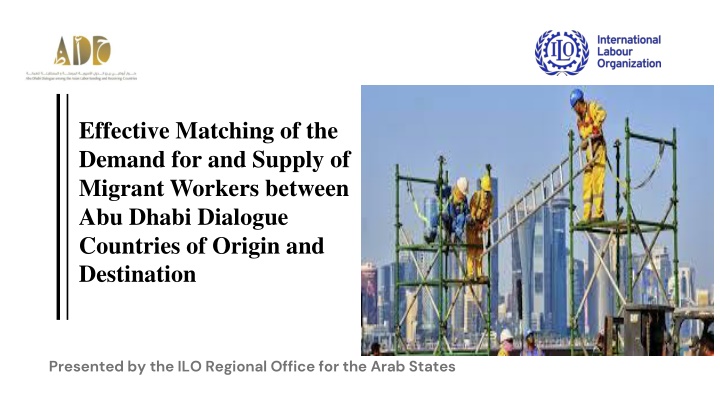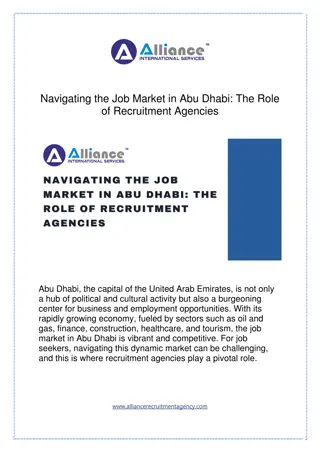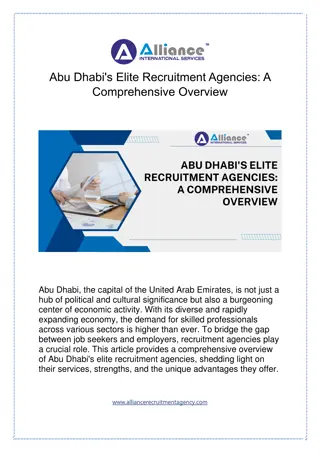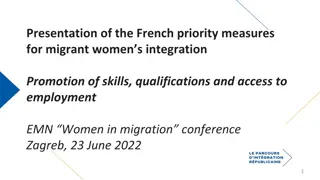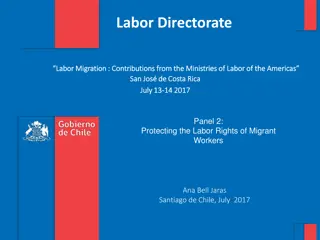Matching Demand for Migrant Workers in Abu Dhabi Dialogue Countries
Presentation by the ILO Regional Office for the Arab States on matching the demand for migrant workers between Abu Dhabi Dialogue countries of origin and destination, addressing skill shortages and mismatches, economic growth projections, and policy recommendations.
Uploaded on Mar 05, 2025 | 0 Views
Download Presentation

Please find below an Image/Link to download the presentation.
The content on the website is provided AS IS for your information and personal use only. It may not be sold, licensed, or shared on other websites without obtaining consent from the author.If you encounter any issues during the download, it is possible that the publisher has removed the file from their server.
You are allowed to download the files provided on this website for personal or commercial use, subject to the condition that they are used lawfully. All files are the property of their respective owners.
The content on the website is provided AS IS for your information and personal use only. It may not be sold, licensed, or shared on other websites without obtaining consent from the author.
E N D
Presentation Transcript
Effective Matching of the Demand for and Supply of Migrant Workers between Abu Dhabi Dialogue Countries of Origin and Destination Presented by the ILO Regional Office for the Arab States
OUTLINE 01. 02. 03. 04. 05. 06. 07. 08. Context and Key Questions Research Methodology Snapshot of Labour Market Trends in Destination Countries Matching the GCC Labour Demand: Skill Initiatives Matching the Supply and Demand: Skills Recognition of Migrant Workers Emerging Best Practices in the Asia-GCC Migration Corridor Conclusion Policy Recommendations
CONTEXT Over USD 120 billion Remittance from 27 million foreign workers (53% of total population) (World Bank, 2022) Yet, GCC countries suffer skill mismatches and shortages across industries, threatening the GCC labour market. Resilient economies Abu Dhabi Dialogue (ADD) member states have yet to develop a system to (a) create and share a regional skills database (b) match the skilled labour demand and migrant worker supply (c) establish effective mutual skills and qualification recognition frameworks Despite multiple crises, Gulf Cooperation Council (GCC) countries remain resilient with a projected economic growth rate of 3.2% in 2024 (IMF, 2023)
KEY QUESTIONS 01. In what proportion does GCC countries' growing need for migrant workers reflect the labour market relevance of skills in the GCC and Asian countries of origin? 02. How do the lack of organized and accessible skills data and skills recognition affect the Asia- Gulf migration corridor?
METHODOLOGY FIELD OBSERVATIONS During interactions and consultations DESK REVIEW Governments policies on skills recognition, ADD reports, academic and policy literature on labour migration CONTENT ANALYSIS Media reports on the Asia-GCC labour migration corridor and skills issues, bilateral skills agreements SEMI-STRUCTURED INTERVIEWS PROCESS TRACING CASE STUDIES Implementation processes of bilateral agreements Senior government officials, employers, migration policy experts, skills training providers, assessment and certification agencies, recruitment agencies, and migrant workers ADD GCC Destination: Saudi Arabia and UAE ADD Asian Origin: Pakistan, Philippines, and India
SNAPSHOT OF LABOR MARKET TRENDS IN GCC Case Studies: Saudi Arabia and UAE Lack of Responsive Skilling Rapid economic recovery after COVID-19 - continues to create new jobs and has increased the demand of skilled foreign workers There is however a lack of responsive skill delivery mechanisms, programmes or partnerships for migrant workers or employers despite growing skills investment in Asia origin countries - Despite growing labour market nationalization efforts, particularly of skilled and semi-skilled occupations, both Saudi Arabia and UAE have increasing labour market demands across various sectors: Data Availability Freight, Logistics, and Transportation Skill demand data is mainly available with the private sector which is moving the demand Construction Care work Service-Based Sectors (Hospitality, etc.) (domestic work, health care professionals, and caregivers)
MATCHING THE GCC LABOUR DEMAND: SKILL PROFILES & INITIATIVES OF SELECTED ASIAN ORIGIN COUNTRIES & LABOUR SUPPLY DYNAMICS ADD Asian-origin countries, including the Philippines, India, and Pakistan, have an adequate labour supply that can match the GCC labor demand in the short run. Yet, the growing competition from other regional labour markets (i.e., Europe, East and Southeast Asia), specifically in the care sector, construction, and digital IT, can negatively impact the GCC states / private sectors' competitiveness in the long run due to opportunities, better conditions and protection in the former. Philippines India Pakistan Care sector Construction Construction (domestic work, caregiving, and nursing) Construction (semi-skilled) Digital IT sector Transportation Philippines-Japan Memorandum of Agreement on Specified Skilled Workers (i.e., nurses, healthcare workers, etc.) EU-India Memorandum of Agreement on semi conductors Pakistan and Saudi Arabia Bilateral Skills Agreement (under Takamol s) Workers Recruitment Skills Verification Program
MATCHING THE SUPPLY AND DEMAND: SKILLS RECOGNITION OF MIGRANT WORKERS Saudi Skills verification prog. is however moving across South Asia for construction sector In general, trend in corporatized skills recognition and certification dominates the Asia-GCC corridor There is a resistance from powerful private sector actors against centralized skills certification as this makes the workers more mobile and costly Limited bilateral skills matching and recognition processes due to domestic sovereignty concerns between states. Key examples: UAE-Philippines (Construction, hospitality and other services sectors) UAE India (Construction) Saudi Arabia-India (Mainly construction) Implementation process of these bilateral skills matching initiatives is slow, inconsistent and has yet to bring the desired result.
EMERGING BEST PRACTICES IN THE ASIA-GCC LABOUR MIGRATION CORRIDOR South Asia Qualifications Reference Framework Innovations for Training (UAE) Lack of ADD host country- regulated skills recognition processes in the GCC has led multiple actors to establish diverse skills recognition and upskilling initiatives to increase competitiveness of migrant workers in the GCC. Philippines TESDA / Dept of Migrant Workers for upskilling in the GCC Emerging skilling initiatives in the Asia-GCC labour migration corridor: Tadbeer (Upskilling for domestic workers) Private Recruitment Training and Certification Centers Al Habtoor (Upskilling construction workers)
The Philippine TESDA Department of Migrant Workers Skills Recognition and Certification Collaboration in the Middle East (in Dubai, UAE)
Private Recruitment Training and Certification Centers (for caregivers)
Housekeeping Co (Dubai, UAE) (for domestic helpers)
Al Habtoor Group(for construction workers)
CONCLUSION (1) Labour demand across various skills in the GCC has continued to intensify, while labour supply in Asian origin countries remains high. (2) However, an interregional mechanism for skills recognition between Asian and GCC countries is limited. (3) Some promising bilateral skills cooperation arrangements have partial impacts - these need to be further analyzed to draw lessons and action. (4) The growing demand for other regional labour markets directly poses challenges to GCC private sector in the long run. (5) Soft immigration policies (i.e. tourist visas) of some GCC countries can undermine the prospects of regulating skill labour supply and guaranteeing welfare protection to migrant workers.
RECOMMENDATIONS: RESEARCH & ANALYSIS LANDSCAPE ANALYSIS COMPARATIVE STUDY REVIEW FRAMEWORKS & STANDARDS Undertake a comparative study of selected skill priority occupations and examine the different processes of recognition and certification Analyze existing migrant skilling programmes and infrastructures, and their overall implications on migrant workers productivity, mobility, and welfare Review existing qualifications frameworks and systems, occupational and competency standards and competency levels in GCC and Asian origin countries to identify priority skills and occupations relevant for developing regional standards OCCUPATIONAL STANDARDS SKILL COOPERATION AGREEMENTS Review existing bilateral skill cooperation agreements and their impact on current and prospective migrant workers welfare and mobility outcomes. Develop occupational standards of the most priority sectors and occupations in demand in the GCC by pairing GCC and Asian origin countries
RECOMMENDATIONS: MECHANISMS FOR SKILLS MATCHING KNOWLEDGE SHARING ONE-STOP SHOP CENTRES REPORTING STREAMLINED PROCESSING Facilitate knowledge sharing between senior officials on skills matching and recognition for migrant workers between the ADD and other sub- regions (i.e., ASEAN, South Asia, European Union) Ensure coherence between skilling and certification processes and immigration policies to streamline the admission of all levels of skilled workers into GCC countries. Link GCC-based accredited private sector employers with accredited one-stop shop centres in Asian origin country locations Develop an annual ADD-led skills matching and skills gaps report
POLICY RECOMMENDATIONS FEASIBILITY STUDY Conduct a feasibility study to assess different policy options, methodologies and tools to compare recognition of skills and qualifications COST-SHARING POLICY Develop guidelines for a cost-sharing policy at the ADD, mandating employers to pay or share and explore innovative means to cover the cost of GCC skills and training certification INTERNATIONAL SKILLS PASSPORT INTERREGIONAL MOBILITY Develop interregional labour mobility pathways for skilled and medium-skilled sectors (i.e. linking GCC regional employment sites like Bayt.com with accredited employment centres in Asian origin countries) Examine the utility and cost- effectiveness of developing an international skills passport in GCC and Asian origin countries
